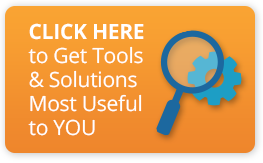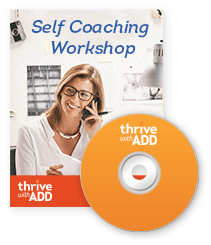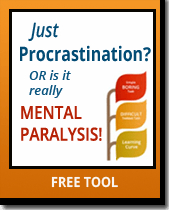
How to change your words and banish ADHD shame
What you say defines you. Not just to others, but to yourself. When guilt, embarrassment, or ‘not enoughness’ of ADHD slip into your conversation, you transmit insecurity and shame. Worse, you reinforce that message to yourself.
But if you pause just long enough to reconsider and revamp your statements, you reap all kinds of benefits. Not just if you’re ADHD, by the way. Everyone wins!
Consider the standard Monday morning question. “How was your weekend?”
You can allow your automatic shame-based ADHD-generated answer to slip out, unedited. My version of that would be: “Oh, you know, I watched YouTube videos all day and got nothing done.”
Please — STOP THAT. You actually have the power to pay attention, take control, and establish a habit that ultimately enhances your image, attitudes, and self-confidence.
I know, because I’ve worked hard to master the “r” factor. That is, I’ve learned to review my internal dialogue, reflect on whether it transmits the right message, reframe my statements in more positive terms, and finally, rephrase my comments in empowering, energetic language.
R you ready to learn how to take aim against ADHD shame? Here goes:
Review: Listen to yourself
Scientists estimate that roughly 70 per cent of our 60-80,000 daily ‘self-talk’ – the thoughts that narrate our lives – consists of negative comments. That means we inundate ourselves with doubt, judgement, criticism, and – that word again – shame. I wouldn’t be surprised if the percentage was even higher among us ADHD folks.
Simply voicing our internal critic gives it objective truth.
The solution? Don’t let ADHD, self-doubt, or embarrassment do the talking. Listen carefully to your inner narrative and decide whether it represents the “you” others should see.
If you leave negative self-talk unchallenged, you’re likely to answer the “How was your weekend?” query with a self-depreciating downer.
“I was such a slug,” you may say, “I binge-watched Netflix and was super unproductive,” Or, “I don’t know if it’s the pandemic or what, but I never finished what I needed to during the weekend.”
Really? Maybe that’s just the single bitter slice of a far sweeter fruit.
Reflect and reconsider
Put aside your ADHD for a minute and level with yourself. There were undoubtedly moments of happiness, serendipity, or relaxation during your weekend. So go there.
Unless you’re really determined to keep hitting yourself over the head, notice and erase that self-depreciating language from your casual conversation.
Reframe it in different words
Once you’ve tossed out the terrible stuff, it’s time to reframe your experiences in growth-enhancing terms. Yes, it may feel Pollyanna positive, but it’s really just about reestablishing control over your ADHD. You decide how you want to portray yourself, your weekend, or your binge watching, substituting kindness and understanding for self-flagellation.
Ask yourself: did you waste your time, or did you appropriately use the weekend to recharge your batteries? Did you learn something new?
After all, you’re allowed a few indulgences, especially now.
Rephrase: Find new words
With the unpleasant critique out of the way, you can rephrase your answer in terms that are:
1. More positive, 2. More purposeful, 3. Less driven by ADHD, and 3. True.
For example:
“My weekend was really low-key, so I’m rested and ready for whatever happens this week.” OR, “I treated myself to a two-day stay-cation, ordered food in, and blissed out watching Netflix.”
What’s missing in your revamped response? Shame.
You’ve telegraphed a simple fact: ADHD or not, you consider yourself worthy and deserving of special treatment. And no, you are not a bum!
Remember, your words are instructive. They teach others how to view you – and they inform your own opinion of yourself.
If you apologize or criticize yourself, you suggest that you have something to be ashamed of. But if you accept yourself unapologetically, you model security, solidity, and self-awareness. Even when it comes with a touch of laziness.
Hey, you’re human!
By the way, after spending several weekends “unproductively” hyper-focusing on 8+ hours of art videos at a stretch, I’ve created some cool new mixed media paintings in a style I’ve never done before, just using pens and acrylic ink. NOT SORRY!!





Sidney Wilson
CommentThank you! You are a great help!
It is really hard for me sometimes and I guess I blame myself more than I should.
Bonnie Mincu
Please practice re-framing your message! Self-blame just adds more pressure and negativity, and keeps you from dispassionately learning from situations or evaluating what you could do differently next time. Suggestion: in every disappointing situation, find one tiny positive thing to congratulate yourself on (even if it’s just that you survived it!)
mary frances fitzgerald
Fabulous. I am a sessional teaching a University Foundations Course, and I find many of these students are being identified as students with ADHD. My thoughts are that I wish this would have happened earlier in their educational/school lives because, after many years of negative self-talk and self-image, they have much reframing to practice. Thanks for sharing this work.
Bonnie Mincu
Mary Frances, unfortunately I’m sure you’re right about students immersed in negative self-talk having a lot to overcome. I have no doubt you’ll be a positive influence for them in doing so!